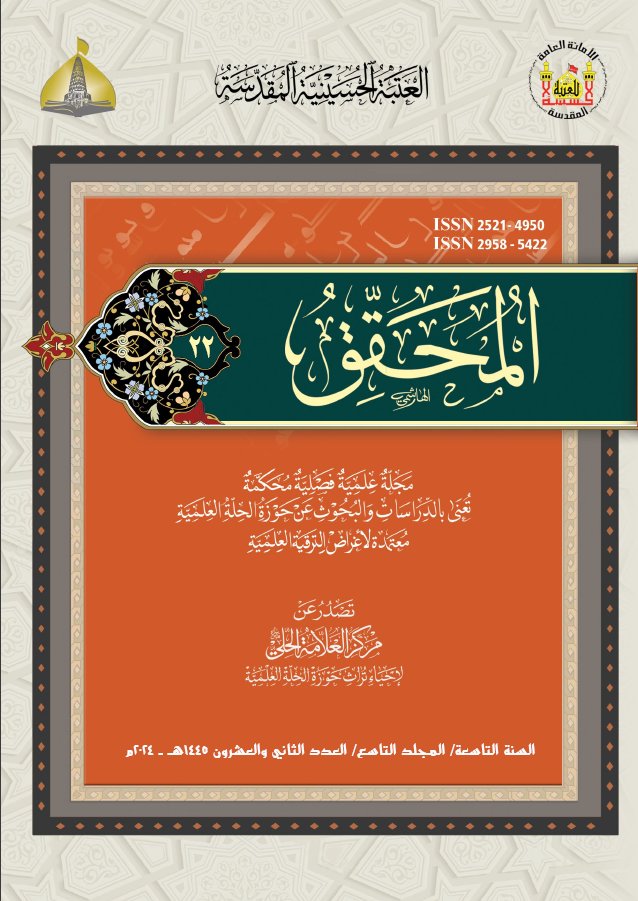Abstract
In this research, we have delved into the foundational ideas and principles of Usul (principles) that Ibn Idris al-Hilli utilised in his encyclopedic jurisprudential work titled "Al-Sara'ir al-Hawi li-Tahrir al-Fatawa". We examined the impact of these principles on the process of legal deduction, as the process of deduction cannot be accomplished without relying on Usuli mechanisms and principles.
We believe that this Usuli thinking marks the beginning of a new phase in the stages of deduction witnessed within the science of Usul, particularly within the Hilla school, which adopted a more comprehensive approach to deduction and its subsequent ramifications. Ibn Idris relied on fundamental Usuli ideas in the process of deduction, such as the notion of the non-authoritativeness of singular reports and its promotion to the rank of established principles of the school (Usul al-Madhhab). All of this necessitates a careful examination of Ibn Idris al-Hilli's methodology in deduction, distinguishing his approach and uniqueness from those who preceded him in this field.
We believe that this Usuli thinking marks the beginning of a new phase in the stages of deduction witnessed within the science of Usul, particularly within the Hilla school, which adopted a more comprehensive approach to deduction and its subsequent ramifications. Ibn Idris relied on fundamental Usuli ideas in the process of deduction, such as the notion of the non-authoritativeness of singular reports and its promotion to the rank of established principles of the school (Usul al-Madhhab). All of this necessitates a careful examination of Ibn Idris al-Hilli's methodology in deduction, distinguishing his approach and uniqueness from those who preceded him in this field.
Abstract
تطرقنا في هذا البحث إلى الأفكار والقواعد الأُصُوليّة التي أَفادَ منها ابنُ إِدريس الحِلِّيّ في موسوعته الفقهية الموسومة بـ (السرائر الحاوي لتحرير الفتاوي)، وتأثير هذه القواعد في عملية الاستنباط الفقهي، فإنَّ عمليَّة الاستنباط لا يمكن لها أنْ تتمَّ مِن دون الاعتماد على الآليات والقواعد الأُصُوليّةِ.
ونعتقد أنّ هذا التفكير الأُصُوليّ هو البداية لمرحلة جديدة من مراحل الاستنباط التي مرّ بها علم الأُصُول وخصوصًا في مدرسة الحلّة التي اعتمدت نهجًا أكثر شموليّة في عملية الاستنباط وما تبعها من تفريعات كثيرة.
وقد اعتمد ابنُ إدريس على أفكار أصوليّة أساسيّة في عمليّة الاستنباط، كالقول بعدم حجّية خبر الواحد وترويجه لاصطلاح (أُصُول المذهب)، كذلك دليل الاعتبار، فكلّ ذلك يستدعي وقفة متأنّية على منهج ابن إِدريس الحِلِّيّ في عملية الاستنباط وفرقه وتمايزه عمَّن سَبَقَهُ في هذا المضمار.
ونعتقد أنّ هذا التفكير الأُصُوليّ هو البداية لمرحلة جديدة من مراحل الاستنباط التي مرّ بها علم الأُصُول وخصوصًا في مدرسة الحلّة التي اعتمدت نهجًا أكثر شموليّة في عملية الاستنباط وما تبعها من تفريعات كثيرة.
وقد اعتمد ابنُ إدريس على أفكار أصوليّة أساسيّة في عمليّة الاستنباط، كالقول بعدم حجّية خبر الواحد وترويجه لاصطلاح (أُصُول المذهب)، كذلك دليل الاعتبار، فكلّ ذلك يستدعي وقفة متأنّية على منهج ابن إِدريس الحِلِّيّ في عملية الاستنباط وفرقه وتمايزه عمَّن سَبَقَهُ في هذا المضمار.
